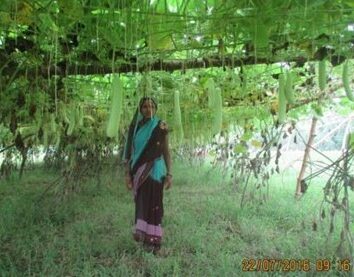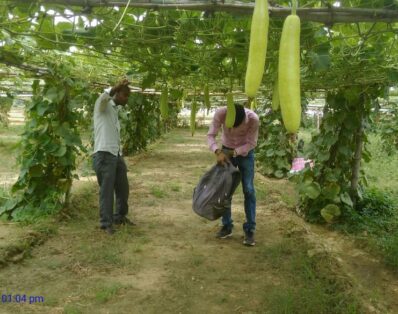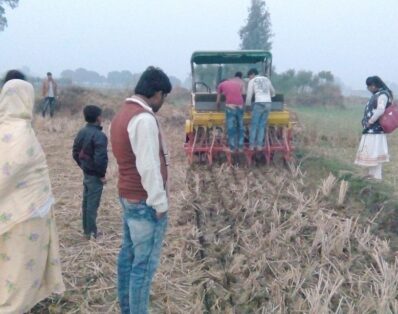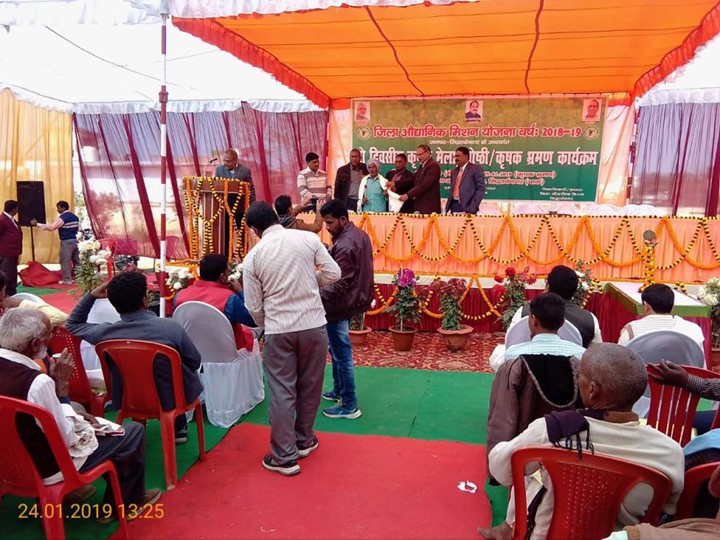Case story: From Struggles to Success: Suryamati and Ramdin’s Journey with Machan Farming
Introduction
In the heart of Khutwa village, situated in Kudia Gram Panchayat, Siddharthnagar district, Uttar Pradesh, Suryamati and Ramdin were struggling to sustain their family through traditional farming. However, their adoption of Machan Farming, introduced by Swabhiman Samiti under the Fasal-2 Project, revolutionized their lives. The couple embraced this innovative farming technique, overcoming financial struggles and inspiring a wave of change in their community.
The Challenge
- Insufficient Income from Traditional Farming:
- With just 0.12 acres of land, growing wheat yielded a mere 2 quintals, leaving a net income of only ₹1,200. This was insufficient to support their 12-member family.
- Dependence on Migrant Labor:
- Their eldest son, Rabindra, worked 7-8 months a year in another state to supplement the household income.
- Lack of Awareness of Modern Techniques:
- Stuck with conventional farming methods, the couple lacked exposure to cost-efficient, sustainable agricultural practices.
The Solution
In September 2015, Suryamati and Ramdin became members of the Asha Women Farmers’ Group, a key initiative under the Fasal-2 Project by Swabhiman Samiti. Through this program, they were introduced to Machan Farming, a vertical cultivation technique that optimizes land use.
Key Interventions:
- Training on Advanced Techniques:
- Sessions on water conservation, pest management, and diversified cropping.
- Practical demonstrations on building and utilizing machans for vertical farming.
- Material and Technical Support:
- Step-by-step guidance for setting up machans, sourcing bamboo, GI wire, ropes, compost, seeds, and other resources.
- Encouragement to Start Small:
- Field supervisors provided ongoing support, encouraging them to test Machan Farming on a small scale.



The Transformation
In 2017-18, with a modest investment of ₹21,500, Suryamati and Ramdin adopted Machan Farming on 500 square meters of their land. They diversified their crops, planting:
- Bottle gourd, onion, yam, and bitter gourd.
Results:
- Total Revenue: ₹66,625.
- Net Profit: ₹45,125.
- Incremental Income: ₹43,925 compared to previous farming practices.
Results and Achievements
- Economic Empowerment:
- With the increased income, they purchased a buffalo for ₹35,000, which now produces 5 liters of milk daily.
- Using buffalo dung for compost has further reduced fertilizer expenses.
- Improved Livelihood:
- Rabindra no longer migrates for work and now assists in farming and selling vegetables in the local market.
- Recognition:
- Ramdin received a Certificate of Excellence from the District Horticulture Office at the January 2019 Farmer’s Fair, acknowledging their success with Machan Farming.
- Community Inspiration:
- Inspired by their success, 9 women from Khutwa adopted Machan Farming in 2018-19, creating a ripple effect of sustainable practices.
Conclusion
Suryamati and Ramdin’s journey illustrates the transformative potential of Machan Farming and community-driven initiatives. By increasing their income, reducing reliance on migration, and motivating others to innovate, they have become role models for sustainable agriculture. Their story highlights the impact of empowering farmers through education, training, and community collaboration.
Acknowledgment
The success of Suryamati and Ramdin would not have been possible without the support of Swabhiman Samiti and the Fasal-2 Project, which continues to promote innovative farming techniques and uplift rural communities in Siddharthnagar district.






